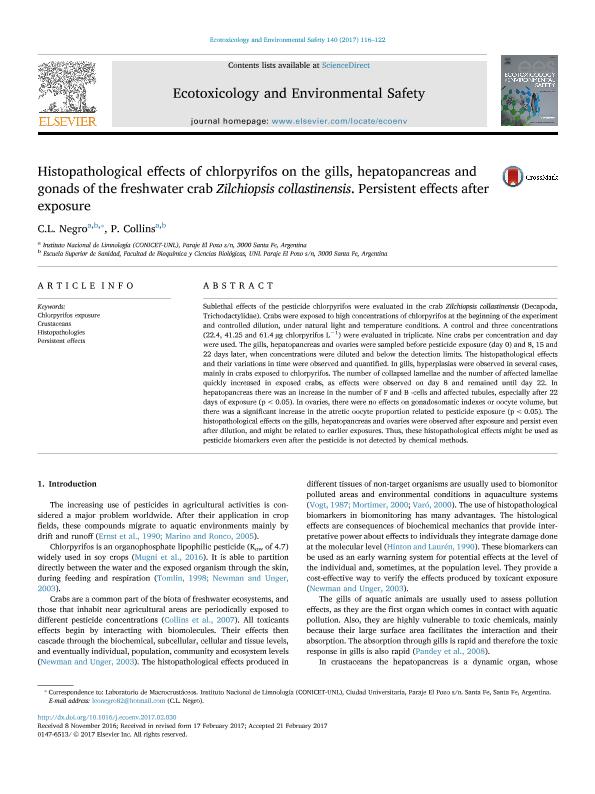Mostrar el registro sencillo del ítem
dc.contributor.author
Negro, Carlos Leandro

dc.contributor.author
Collins, Pablo Agustin

dc.date.available
2018-09-17T14:25:58Z
dc.date.issued
2017-06
dc.identifier.citation
Negro, Carlos Leandro; Collins, Pablo Agustin; Histopathological effects of chlorpyrifos on the gills, hepatopancreas and gonads of the freshwater crab Zilchiopsis collastinensis. Persistent effects after exposure; Academic Press Inc Elsevier Science; Ecotoxicology and Environmental Safety; 140; 6-2017; 116-122
dc.identifier.issn
0147-6513
dc.identifier.uri
http://hdl.handle.net/11336/59842
dc.description.abstract
Sublethal effects of the pesticide chlorpyrifos were evaluated in the crab Zilchiopsis collastinensis (Decapoda, Trichodactylidae). Crabs were exposed to high concentrations of chlorpyrifos at the beginning of the experiment and controlled dilution, under natural light and temperature conditions. A control and three concentrations (22.4, 41.25 and 61.4 µg chlorpyrifos L−1) were evaluated in triplicate. Nine crabs per concentration and day were used. The gills, hepatopancreas and ovaries were sampled before pesticide exposure (day 0) and 8, 15 and 22 days later, when concentrations were diluted and below the detection limits. The histopathological effects and their variations in time were observed and quantified. In gills, hyperplasias were observed in several cases, mainly in crabs exposed to chlorpyrifos. The number of collapsed lamellae and the number of affected lamellae quickly increased in exposed crabs, as effects were observed on day 8 and remained until day 22. In hepatopancreas there was an increase in the number of F and B -cells and affected tubules, especially after 22 days of exposure (p<0.05). In ovaries, there were no effects on gonadosomatic indexes or oocyte volume, but there was a significant increase in the atretic oocyte proportion related to pesticide exposure (p<0.05). The histopathological effects on the gills, hepatopancreas and ovaries were observed after exposure and persist even after dilution, and might be related to earlier exposures. Thus, these histopathological effects might be used as pesticide biomarkers even after the pesticide is not detected by chemical methods.
dc.format
application/pdf
dc.language.iso
eng
dc.publisher
Academic Press Inc Elsevier Science

dc.rights
info:eu-repo/semantics/openAccess
dc.rights.uri
https://creativecommons.org/licenses/by-nc-nd/2.5/ar/
dc.subject
Chlorpyrifos Exposure
dc.subject
Crustaceans
dc.subject
Histopathologies
dc.subject
Persistent Effects
dc.subject.classification
Meteorología y Ciencias Atmosféricas

dc.subject.classification
Ciencias de la Tierra y relacionadas con el Medio Ambiente

dc.subject.classification
CIENCIAS NATURALES Y EXACTAS

dc.title
Histopathological effects of chlorpyrifos on the gills, hepatopancreas and gonads of the freshwater crab Zilchiopsis collastinensis. Persistent effects after exposure
dc.type
info:eu-repo/semantics/article
dc.type
info:ar-repo/semantics/artículo
dc.type
info:eu-repo/semantics/publishedVersion
dc.date.updated
2018-09-14T13:21:51Z
dc.journal.volume
140
dc.journal.pagination
116-122
dc.journal.pais
Países Bajos

dc.journal.ciudad
Amsterdam
dc.description.fil
Fil: Negro, Carlos Leandro. Consejo Nacional de Investigaciones Científicas y Técnicas. Centro Científico Tecnológico Conicet - Santa Fe. Instituto Nacional de Limnología. Universidad Nacional del Litoral. Instituto Nacional de Limnología; Argentina
dc.description.fil
Fil: Collins, Pablo Agustin. Consejo Nacional de Investigaciones Científicas y Técnicas. Centro Científico Tecnológico Conicet - Santa Fe. Instituto Nacional de Limnología. Universidad Nacional del Litoral. Instituto Nacional de Limnología; Argentina
dc.journal.title
Ecotoxicology and Environmental Safety

dc.relation.alternativeid
info:eu-repo/semantics/altIdentifier/url/http://www.sciencedirect.com/science/article/pii/S0147651317300945
dc.relation.alternativeid
info:eu-repo/semantics/altIdentifier/doi/http://dx.doi.org/10.1016/j.ecoenv.2017.02.030
Archivos asociados
